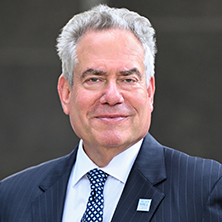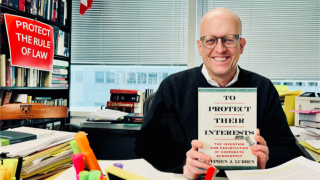 Ronald H. Weich, prominent legal authority, settled into the newest role of his impressive
legal career, Dean of Seton Hall University School of Law, on July 1, 2024.
Ronald H. Weich, prominent legal authority, settled into the newest role of his impressive
legal career, Dean of Seton Hall University School of Law, on July 1, 2024.
As the nation prepared for the July 4th tradition of barbeques and fireworks to celebrate Independence Day, Weich personally communicated his eagerness to meet the challenges of this new position while expressing his optimism for the future.
“I know I have joined a law school with a rich history, devoted faculty members, administrators and staff, and excellent students,” Weich said in an early-morning message to the Law School community.
Members of the University community echoed that sentiment of optimism and expressed their respect for Weich’s ascendancy to the deanship.
“Today we are delighted to welcome Dean Weich to the Law School and to Seton Hall University,” said Erik Lillquist, J.D., Deputy Provost, Chief Administrative Officer and Executive Vice President, Seton Hall University. “He has cultivated an impressive legal career that includes well-regarded academic administration, high-level federal service, and successful private practice.”
The selection of the School’s newest dean was based on his highly regarded body of work, scholarship, and legal acumen – in practice, government service, and as the dean of a law school, which the ABA and the Association of American Law Schools found to be “impressive” in its re-accreditation review, noted Lillquist.
Weich comes to Seton Hall from the University of Baltimore School of Law, where he had served as dean since 2012. While at Baltimore Law School, he led a faculty of 45 tenured and tenure-track professors, as well as many adjunct faculty members, teaching fellows, and professors of practice. In addition, he managed the school’s annual budget of roughly $22 million and led the development of a strategic plan that emphasizes admission standards, academic excellence, faculty scholarship, and career development.
His deanship at Baltimore spanned a period of upheaval in American legal education. Declining enrollment nationwide and the coronavirus pandemic created extraordinary stressors that Baltimore Law successfully navigated under his leadership. He employed an approach that relied on preserving academic standards, prudent fiscal management, open and transparent communication, and increasing external fundraising.
To that end, Baltimore School of Law obtained government and philanthropic funding for its human trafficking and pretrial justice clinics, as well as the Sayra and Neil Meyerhoff Center for Families, Children and the Courts. Most recently, Dean Weich helped secure a $3 million gift to establish the Center for Criminal Justice Reform and a criminal defense and advocacy clinic.
“Dean Weich’s qualifications, leadership experience and legal acumen are of the highest caliber,” said Paula Franzese, Peter W. Rodino Professor of Law, who led the dean search committee along with Tom Scrivo, Law ’89. “He embodies the tradition of excellence, servant-leadership and compassion that is demonstrated every day by Seton Hall Law faculty, students, staff and alumni. That tradition has propelled our graduates to the highest levels of the bench and bar. It is what renders our Law School so exceptional. We welcome Dean Weich with great enthusiasm as we begin to write our next chapter.”
Prior to his time in academia, Weich was appointed by President Obama and confirmed by the U.S. Senate to serve as Assistant Attorney General for Legislative Affairs in the Department of Justice, a post he held from 2009 to 2012. His work in Washington, D.C., included several other prominent positions, including Chief Counsel to U.S. Senators Edward M. Kennedy and Harry Reid. Weich also served as a partner in the firm of Zuckerman Spaeder LLP.
Weich began his career in the Manhattan District Attorney’s Office as an Assistant District Attorney. He is a graduate of Yale Law School, which he attended after undergraduate studies at Columbia University and the London School of Economics.
“Dean Weich believes that law is more than a profession; it is a calling to help one’s
neighbors,” said Lillquist. “He understands that a law license is a mandate to help
others through wise counseling, zealous advocacy, and ethical leadership. His perspective
and wide experience will certainly help advance Seton Hall Law among the nation’s
best and most dynamic centers of legal education.”
For more information, please contact:
Seton Hall Law School







